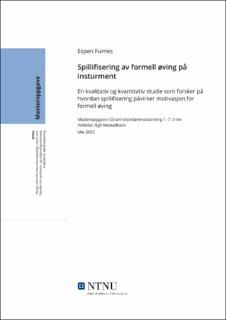| dc.contributor.advisor | Egil Reistadbakk | |
| dc.contributor.author | Espen Furnes | |
| dc.date.accessioned | 2022-07-20T17:21:01Z | |
| dc.date.available | 2022-07-20T17:21:01Z | |
| dc.date.issued | 2022 | |
| dc.identifier | no.ntnu:inspera:113335787:34099159 | |
| dc.identifier.uri | https://hdl.handle.net/11250/3007409 | |
| dc.description.abstract | Å beherske et instrument godt er en viktig del av en musikklærers kompetanse (Eidsvaag & Angelo, 2021), og å lære seg dette krever formell øving over tid, som ikke alle nødvendigvis er motivert for (Lehmann & Davidson, 2002, i Bonneville-Roussy & Bouffard, 2015). Denne masteroppgaven tar for seg denne tematikken, gjennom å undersøke hvilken påvirkning spillifisering kan ha på motivasjon for formell øving på instrument. For å finne svar på dette er det utviklet en enkeltcasestudie, hvor fire deltakere som har musikk som fag på lærerstudiet ved NTNU har deltatt i et forskningseksperiment. Datainnsamlingen er innenfor mixed methods, der kvantitativt spørreskjema og kvalitativt intervju er benyttet for å finne svar på problemstillingen: Hvordan påvirker spillifisering musikklærerstudenters motivasjon for formell øving på instrument?
Mixed methods er forbundet med vitenskapsteorien pragmatisme som denne masteroppgaven posisjonerer seg innenfor. Deltakernes refleksjoner rundt erfaringer av handlinger, som kommer frem på ulke måter i den innsamlede kvantitative og kvalitative empirien, gir uttrykk for funn som svarer på problemstillingen. Funnene fra det kvalitative materialet er vektlagt størst, mens det kvantitative er brukt for å understøtte, nyansere og supplementere disse funnene. Noen av de viktigste funnene er at spillifisering kan føre til bevisstgjøring, gjennom at deltakerne erfarer progresjon og positiv bruk av tid. Dette viser seg å ha en positiv påvirkning på motivasjon. Spesielt bruken av informerende belønninger i spillifiseringen kan være en årsak til dette. På den andre siden viser forskningseksperimentet at spillifisering i enkelte tilfeller kan være lite autonomistøttende, som kan være et hindre for den indre motivasjonen for formell øving. Samlet sett har prosjektet i liten grad påvirket motivasjonen gjennom spillifisering av formell øving på instrument. En grunn for dette kan være den allerede indre motivasjonen deltakerne hadde før øving ved prosjektstart, eller at spillifisering burde ha pågått over lengre tid. Mer forskning er nødvendig som utforsker disse faktorene i større detalj. | |
| dc.description.abstract | Mastering an instrument well is an important part of a music teacher 's competence (Eidsvaag & Angelo, 2021), and learning it requires formal practice over time, which not everyone is necessarily motivated towards (Lehmann & Davidson, 2002 in Bonneville-Roussy & Bouffard, 2015). This master 's thesis addresses this topic, by examining the impacts that gamification can have on motivation for formal practice on an instrument. To find answers regarding this, a single-case study has been developed, which include four music teacher students as participants in a research experiment. The data collection is within mixed methods, where a quantitative questionnaire and a qualitative interview are used to find answers to the research problem: How does gamification impact music teacher students ' motivation towards formal practice on an instrument?
Mixed methods are associated with pragmatic world view, a theory of science which this master 's positions itself. The participants' reflections on experience of actions, which emerge in different ways in the collected quantitative and qualitative empirical data, provide a starting point for findings that answer the research problem. The findings from the qualitative material are emphasized the most, while the quantitative ones are used to support, nuance, and supplement these findings. Some of the most important findings are that gamification can lead to awareness, through the participants experiencing progression and positive use of time. This turns out to have a positive impact on motivation. In particular, the use of informative rewards in gamification can be a reason for this. On the other hand, the research experiment shows that gamification in some cases may not be very supportive of autonomy, which may undermine intrinsic motivation for formal practice. Overall, the project has had little impact on motivation through gamifying formal practice. One reason for this may the already intrinsic motivation the participants had for practice at the start of the project, or that the gamification should have lasted for a longer period. More research is needed that explores these factors in greater detail. | |
| dc.language | nob | |
| dc.publisher | NTNU | |
| dc.title | Spillifisering av formell øving på insturment | |
| dc.type | Master thesis | |
